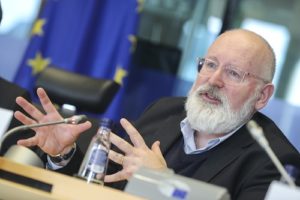
He stated: “CCUS is a building block for a climate-neutral Europe. With programmes such as the recently launched Innovation Fund, the European Commission shows its support for CCUS, which has grown over the years. In the economic recovery, let us also use the new investment cycle of the #NextGenerationEU and the revamped MFF to promote a set of technologies that can lead the transition to climate neutrality by 2050. We need to move along quickly on CCS. CO2 storage needs extra attention including mobilisation of investments.”
“Nuclear power is a Rubik’s Cube with several questions, what device should be put in place to promote European aid to everyone within the framework of the” green pact “as a transitional energy?
European aid is the subject of questions, in particular regarding nuclear power, because even if it is “zero emissions”, it is not green for all that. Indeed, He emphasizes that you have to be patient, until you make a decision on taxonomy. There is waste management which raises questions, but also the fact that this energy is still very expensive to produce.
He calls on France and the other Member States to adopt a rational attitude on their energy choices with a view to climate objectives. Skeptical on nuclear power, he invites the Twenty-Seven to give pride of place to renewable energies.
Climate objectives often represent complex strategic choices. Energy choices cover several sometimes-skeptical questions, including the choice of nuclear power. An example on the political and climate scene is essential for Europe, the European Union wants to put its Fit For 55 slogan on the international scene.
We always calculate the price of the transition, but he indicates that we should also calculate the price of the non-transition.
“Asked about the related issues nuclear. He quotes; “Nuclear power has the great advantage of producing emission-free electricity when we urgently need to reduce our emissions. It also has drawbacks, notably its high price. Member States are deeply divided, some like France believe in its future, others reject it completely, such as Germany, Austria, Luxembourg…
Indeed, countless countries are targeting climate neutrality by the middle of the century, but few of them already have plans to achieve it, while the European Union imposes its circuit. Strategy: “fit for 55. The price of the transition with supporting” green bonds “It represents a face of the European Green Pact.
The automotive sector in the next Wagon? He observes:” it has changed radically in recent years. 2035 is no longer in dispute as the deadline for stopping heat engine production. ”
He says: “Asia, the United States moved before us, but we are catching up.
Frans Timmermans stresses again and again the importance of making “a socially just climate transition.” He stresses that the Commission will provide real and staggering aid, in particular so that the workforce is trained “in new skills, in the jobs of the future”, of which he estimates the number for the automotive sector alone at 2 million.
Responsible for making post-transition Europe “sustainable, competitive, efficient and fair.” He is convinced that we are “capable” of implementing a carbon tax at its borders. His services have identified 5 key sectors (steel, cement, iron, electricity, fertilizer) and will assess over the next two years “whether there is a need to impose a border charge on those who want to export to the European Union.”
Taxonomy an objective that centers on transparency for savers and investors who want their money to be useful for environmental objectives”. Popular “green bonds”: He indicates that it is essential that we have the support of our citizens for the ecological transition, he warns.
In these crucial years, citizens will be compensated “to offset increases in the price of energy, the costs of converting their homes or cars, or purchasing a clean car.” Companies and business will be supported and will have sufficient capital, he assures us.
For him, the European Central Bank (ECB) “is going in the right direction”, like the European Investment Bank (EIB), which will spend half of its resources on climate policy by 2025.
“the financial markets are very positive” he exclaims. They have welcomed our green bonds in an incredible way.”
“to want too much to be exemplary, isn’t Europe shooting itself in the foot?” “On the contrary! Those who are slow to change will have a much heavy price to pay than those who change quickly. We always calculate the price of the transition, but we should also calculate the price of non-transition …”
He concludes. look satisfied. “The European Union was quite isolated two years ago, even a year, when only 30% of the world economy was going towards carbon neutrality. Today Europe is setting an example for the rest of the world.”

















